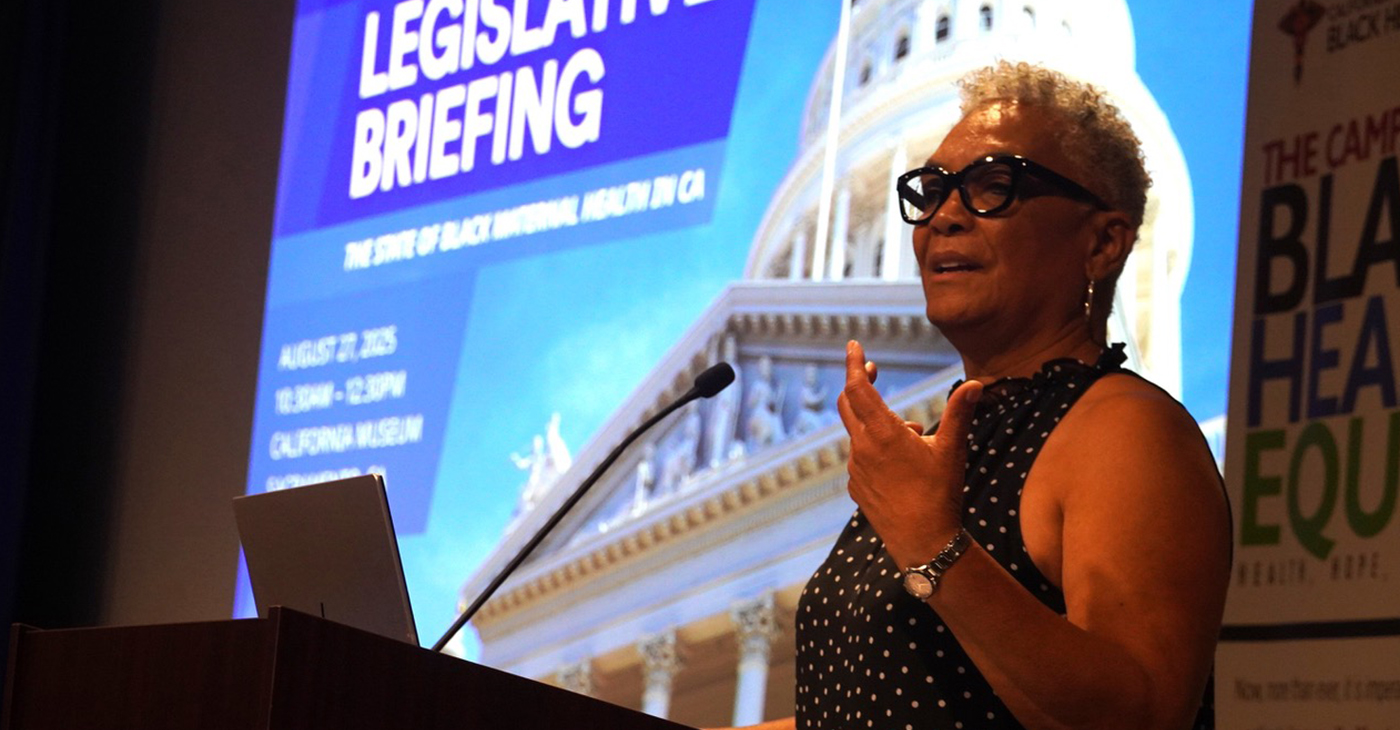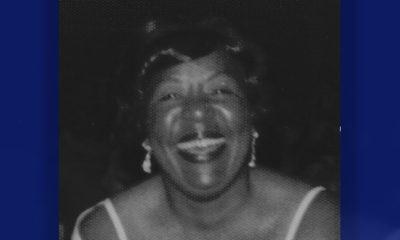Family
Prince George’s Power Couples: Terrells Find Balance
THE AFRO — Attorney Julius Terrell and his wife Cheryl are from two different worlds but have blended their lives into one thriving relationship that works at the office and at home.
By Mark F. Gray
Attorney Julius Terrell and his wife Cheryl are from two different worlds but have blended their lives into one thriving relationship that works at the office and at home. The enterprising couple are separate owners of a law practice and dentistry but have learned to strike a balance between family and work life that fuel their success.
The Terrells have been separate entrepreneurs for more half of their 20 years of marriage. Dr. Cheryl Terrell is owner of Dental Associates of Maryland which is a full service practice based in Bowie. Meanwhile, Julius Terrell, Esq. owns JPT Law, whose practice include estate planning, probate administration, business and family litigation and government relations. He also serves as an arbitrator for the Financial Industry Regulatory Authority.
There is quiet intensity that fuels their drive as individual business inside their shared relationship. Most marriages with dual entrepreneurial spouse are often casualties of the careers because of the time spent with their businesses. However, the Terrells acknowledge that balance between their work and the commitment to family life that are more important than what transpires at the office.
“There’s equal priority between our professional and family lives but the family always comes first,” Julius tells the AFRO.
As their respective practices grew the Terrells also learned how to balance the responsibility of parenting. Their son Julius, a graduate of St. Johns College High School, who is in his freshman year at St. John’s University in New York, was an active participant in youth sports. He was one of the DMV’s top lacrosse players which required the family to make sacrifices for him also. With floating schedules, they faced the challenge of time availability to ensure he could compete in youth and high school activities. They shared the responsibilities of transportation to practice and to games while always making sure that “Jay” was aware his mom and dad were always there on sidelines or the stands for him.
“Its important knowing when to cutback on the work life,” Cheryl tells the AFRO. “You learn along the way that there are times when you have to take off and focus on what’s best for [your child]. Having another person to help with that juggling act helps.”
At least three times per year the Terrells turn their cell phones off and embark on family vacations that will recharge them.
“That time is important because it creates memories and a sense of closeness,” Cheryl adds.
Often there is friction in relationships when spouses are independent business professionals. The different approaches can sometimes lead to an erosion of their personal relationship. However, the Terrell’s have found a balance there as well using each other as sounding boards to develop successful strategies for their uniquely different work spaces.
“It’s like having your own personal board [of directors] at your house,” Julius added. “Having someone who understands what it means to be in business for yourself leads to a meaningful exchange of ideas.”
Their commitment and strength were put to the test in 2013 when Cheryl was diagnosed with breast cancer. The battle between the family and the disease put their relationship and commitment to each front and center. Cheryl was able to maintain the dental practice while Julius was vigilant in servicing his clients and relieving her of the worries associated with being a professional mother. Her cancer has been in remission for five years and counting.
“Julius handled all the dynamics of our lives by himself and I was confident he could to that,” Cheryl said. “It took a big chunk off my worry plate which helped me get better.”
This article originally appeared in The Afro.
Activism
Sacramento: Lawmakers Hear From Health Advocates on “State of Black Maternal Health”
Participants highlighted several past and current bills going through the state Legislature that focus on improving maternal health equity. The proposals address systemic inequities to improve the healthcare experiences of Black women during pregnancy, labor, and postpartum.

By Antonio Ray Harvey, California Black Media
Adjoa Jones is a Los Angeles-based health and community leader who has dedicated her career to advocating for equitable birth outcomes for Black mothers and infants.
Participating in a legislative briefing hosted by the California Black Health Network (CBHN) on Aug. 27, Jones shared stories that shed light on the disproportionately high rate of pregnancy-related complications and deaths among Black women.
Two Black women in Southern California, Jones says, suddenly passed away after giving birth. From Jones’s perspective, those maternal mortalities could have been prevented.
“I come to you speaking from the voices of our community. From the stories of two unforgettable mothers, but it really speaks to the most preventable tragedies,” said, Jones, who is the Director of African American Infant and Maternal Mortality Prevention Initiative at the L.A. County Department.
“It’s not just impacting California, but our nation far and wide,” Jones added during the event titled “The State of Black Maternal Health” and held at the California State Museum in Sacramento.
Participants highlighted several past and current bills going through the state Legislature that focus on improving maternal health equity. The proposals address systemic inequities to improve the healthcare experiences of Black women during pregnancy, labor, and postpartum.
Panelists included Sandra Poole, Health Policy advocate for the Western Center on Law and Poverty, and Brittany Chambers, Associate Professor for the Department of Human Ecology at the University of California at Davis.
Other panelists were Palav Babaria, Deputy Director for the California Department of Health Care Services, and Zea Malawa, Director of Expecting Justice.
Rhonda Smith, the Executive Director of CBHN, served as the host and moderator of the briefing.
“There are amazing and incredible women who are doing amazing work here in the state,” Smith said of the panelists who discussed potential policy solutions and accountability.
During Jones’ presentation, she shared the tragic stories of two women. One was April Valentine, who died on Jan. 10, 2023, after giving birth at Centinela Hospital Medical Center in Inglewood.
According to reports, Valentine died from a blood clot, a pulmonary embolism, that formed in her leg and circulated to her lung. A well-known complication during pregnancy. Valentine’s family members said her condition was preventable, and they filed a wrongful-death claim.
The second woman, 32-year-old Briget Cromer, died in 2023 at California Hospital Medical Center, hours after giving birth to her fifth child. Her family believes her death was due to medical negligence.
Her family’s legal team filed a formal complaint with the U.S. Department of Health and Human Services (USDHH) alleging systemic racial bias in care.
According to the California Department of Public Health, Black women are more likely than their counterparts to die during pregnancy. They represent 5% pregnancies in the state but account for 21% of pregnancy-related deaths.
“We’re doing all that we can to ensure that pregnancy is uplifted (and) pregnancy is a place that’s where folks can enjoy the journey, Jones said.
Sen. Akilah Weber Pierson (D-San Diego), an obstetrician-gynecologist, was the keynote speaker.
“Here in California, we tragically lose another mother due to pregnancy-related complications every five days,” Weber Pierson said. “Here and nationally, Black mothers are three to four times likely to be one of those mothers lost. That’s coming from 40% of maternal deaths.”
Activism
Painter Carla J. Lawson Captures Black Elegance in Bold Prints for Oakland’s Black-Eyed Pea Festival
As a Black woman, Lawson values the connection between her art and her community. She said that her art “needs to feel like Black people to me,” in hopes that her art will culturally resonate with others. Many parts of the Black community inspire her, but often what stands out to her is history. She also talked about being inspired by Black children, by their laughter and joy.

By Daisha Williams
Vacaville painter Carla Lawson invites viewers to her web page with these words: “I create from a center of love and joy, bringing to life the rhythms of my mind through the usage of various mediums.”
Art was Lawson’s hobby when she was young. She worked in retail before devoting herself to painting 16 years ago, with the encouragement of her mother, who didn’t want Carla to have regrets.
As a Black woman, Lawson values the connection between her art and her community. She said that her art “needs to feel like Black people to me,” in hopes that her art will culturally resonate with others. Many parts of the Black community inspire her, but often what stands out to her is history. She also talked about being inspired by Black children, by their laughter and joy.
For example, her Black ballerina-themed prints were initially made to make them look like they are actually dancing because of the way that ink flows and drips. Black ballerinas are often undervalued, but these pieces accurately capture their beauty and grace.
Lawson is almost entirely self-taught, with the exception of two classes at the Academy of Art in the summer of 2000. Lawson continues to attain skill, recently focusing on human anatomy to bring more accuracy to her work while also pushing experimentation with different paints, brushes, and other materials to see how they work together. It often takes her many hours to complete a painting, and sometimes multiple days.
With that devoted practice, she says, over time, the range of her work has grown, and the canvases have gotten bigger!
Lawson sells primarily at festivals and pop-up events in the Bay Area. Her work is also showcased at restaurants and cafes, and she is working toward securing a gallery showing. Prints are for sale on her website, carla-js-art.square.site.
Carla Lawson will be one of the artists at the 10th Annual Black-Eyed Pea Festival, a celebration of traditional African American music, food, and art, on Sat. Sept. 13, from 11 a.m. to 6 p.m. at Marston Campbell Park, 17th and West streets in West Oakland. For more info, go to Oakbepf.com or call 510-332-5851. Bring a chair or blanket for the lawn or reserve a table for six for $150 at https://www.tickettailor.com/events/omnirainstitute/1799229
Alameda County
Mayor Barbara Lee Celebrates Successful National Night Out 2025 with Participation Across Oakland
The annual community-building event brought together residents from East Oakland to West Oakland, from the Hills to Downtown, and everywhere. Mayor Lee visited multiple events throughout the evening, including stops at 121 Monte Vista, 1 Rockridge Place, Sobrante Park in East Oakland, 3833 Lakeshore Ave, and Discover Community Cafe in West Oakland.

By Justin Phillips
Mayor Barbara Lee today praised the overwhelming community participation in National Night Out 2025, with more than 229 events taking place across Oakland neighborhoods on Tuesday evening.
“What an amazing evening in Oakland,” said Lee. “With events happening across every corner of the Town, there was something for everyone to connect with neighbors and celebrate what makes Oakland special.”
The annual community-building event brought together residents from East Oakland to West Oakland, from the Hills to Downtown, and everywhere. Mayor Lee visited multiple events throughout the evening, including stops at 121 Monte Vista, 1 Rockridge Place, Sobrante Park in East Oakland, 3833 Lakeshore Ave, and Discover Community Cafe in West Oakland.
“Tonight was about connection, safety, and showing the love that makes Oakland home,” Lee said.
The events ranged from neighborhood barbecues to block parties to community gatherings, each representing Oakland’s strong community spirit. Mayor Lee expressed her gratitude to every resident, block captain, community leader, and organization that made the evening possible.

Mayor Barbara Lee celebrating National Night Out with community members from Oakland.
“Thank you to every resident, block captain, community leader, and organization making tonight possible,” said Mayor Lee. “This is what Oakland Strong looks like!”
National Night Out is an annual community-building campaign that promotes public safety, community partnerships and neighborhood camaraderie to make neighborhoods safer and more caring places to live.
Justin Phillips is the Communications director in the office of Mayor Barbara Lee.
-

 Activism3 weeks ago
Activism3 weeks agoOakland Post: Week of November 12 – 18, 2025
-

 Activism2 weeks ago
Activism2 weeks agoIN MEMORIAM: William ‘Bill’ Patterson, 94
-

 Activism3 weeks ago
Activism3 weeks agoHow Charles R. Drew University Navigated More Than $20 Million in Fed Cuts – Still Prioritizing Students and Community Health
-

 Bay Area3 weeks ago
Bay Area3 weeks agoNo Justice in the Justice System
-

 #NNPA BlackPress3 weeks ago
#NNPA BlackPress3 weeks agoThe Perfumed Hand of Hypocrisy: Trump Hosted Former Terror Suspect While America Condemns a Muslim Mayor
-

 #NNPA BlackPress2 weeks ago
#NNPA BlackPress2 weeks agoTrump’s Death Threat Rhetoric Sends Nation into Crisis
-

 #NNPA BlackPress4 weeks ago
#NNPA BlackPress4 weeks agoProtecting Pedophiles: The GOP’s Warped Crusade Against Its Own Lies
-

 #NNPA BlackPress2 weeks ago
#NNPA BlackPress2 weeks agoLewis Hamilton set to start LAST in Saturday Night’s Las Vegas Grand Prix























































